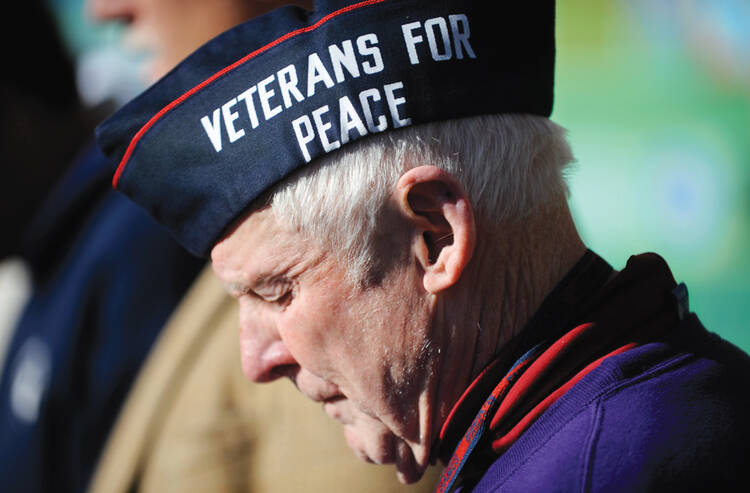Last year, the United States Conference of Catholic Bishops approved a nation-wide collection to benefit the Archdiocese for the Military Services, to be garnered “every three years proximate to Veteran's Day or a similar strategic date beginning in 2013.” The same year this legislation was approved, the USCCB endorsed the cause of Servant of God Dorothy Day, whose Catholic Worker movement inspired a generation. Some of her friends and disciples object to the bishops’ decision to support American military ministry. Catholic Worker Mark Scibilia-Carver criticized the USCCB’s decision in the National Catholic Reporter. As a combat veteran turned Christian pacifist, I sympathize with many of his arguments.
However, there are better reasons to disagree with the explicit support of the military archdiocese, which far predate 2012. After all, “Veterans Day” does not exist in the ecclesiastical lexicon. Prior to 1954, when it became a national holiday, it did not even exist in the national parlance. But a national holiday does not a holy day make, and for 1,500 years or more, the church has celebrated the feast day of a fourth-century bishop of Tours, France, who provides a nuanced and enriching paradigm through which to better understand our relationship with the state.
Martin, named after the Roman god of war, had always wanted to be a Christian, despite his parents’ disapproval. In the year 331, at the age of 15, he was conscripted into the Roman military and entered the Praetorian Guard, the personal security force for the emperors. Within two years, he would famously encounter a freezing beggar in Amiens and clothe him—beautifully enacting one of the corporeal works of mercy. His vision later that night, of Jesus praising his action, led him to be baptized, which is when he supposedly uttered the words of military martyrs Maximilian of Tebessa and Marcellus of Tangier: “I am a soldier of Christ, it is impermissible for me to fight.”
Martin’s friend and biographer, Sulpitius Severus, associated this bold statement with Martin’s service at the Battle of Worms in the late 350s. Historians have since determined that Martin’s encounter with the beggar actually took place 20 years earlier. That means that Martin served in the Roman guard for two decades after his conversion. During that time he had no problem protecting life, but he refused to kill, even though such a stand risked martyrdom.
Martin went on to be made both a priest and a bishop against his will. The cape he split to cloth the beggar—Jesus in disguise—became a relic, protected by monks whose title in Latin was cappellanu. (The plural, cappellani, evolved in French to chapelain, and in English to chaplain.) Martin, the patron of all chaplains, was neither an absolute pacifist nor a blindly obedient patriot. His example is one for all chaplains and those who navigate the line between church and state.
In his 2011 keynote at a conference at Duke University on Martinmas, Lieutenant Colonel Peter Kilner (Catholic catechist as well as an Academy Professor at West Point) made clear that there is both profound tragedy and captivating beauty in war. On a good day, chaplains help discern between the two, as their forebear Martin did.
Instead of presenting the issue as black and white, as if the only options are full-throated support or stringent objection, Catholics and all people of good will must seek to learn from those for whom war is not an abstract concept. Besides Martin there are many saints, martyrs and holy people from whom we can derive a more properly Martian (and less martial) perspective on war.
- Pachomius, an enlisted conscript jailed after refusing to complete his training, became the first cenobitic monk; his “rule of life” inspired the famous rule of Saint Benedict.
- John of God, a Portuguese soldier and patron of booksellers, sustained heavy post-trauma stress and had a breakdown during a sermon by John of Avila. His order, the Brothers Hospitallers, maintains the largest pharmacy in the world, located on the grounds of the Vatican.
- Ignatius of Loyola, a Spanish knight who reveled in the glory of war, lost his taste for it after reading of the lives of the saints. His commitment to God culminated when we abandoned his military vestments and sword at a monastery and went on to found the Jesuits.
- Camillus of Lellis, at first a Venetian soldier, organized the first group that provided medical care for soldiers in battle regardless of which side they fought for in 1601 (250 years before the birth of the Red Cross).
- John Vianney, the patron saint of all priests, who was highly praised by Pope Benedict XVI, was a draft dodger.
As Christians, we are a people set apart by God to make the world holy by our presence and witness. That is where our deliberation and reflections must begin. Then, as we are able, we can deliberate on what it means to be Americans. Saint Martin provides a fitting example, someone who can teach us what it means to love God and country (in that order). Instead of making hasty decisions and statements about war, let us look to lives of those within our own Catholic tradition. By doing so perhaps we will build habits that will help us to listen and learn from those who serve continue to serve in the military today.
Editors’ note: This article was originally published under the name Logan Mehl-Laituri.








